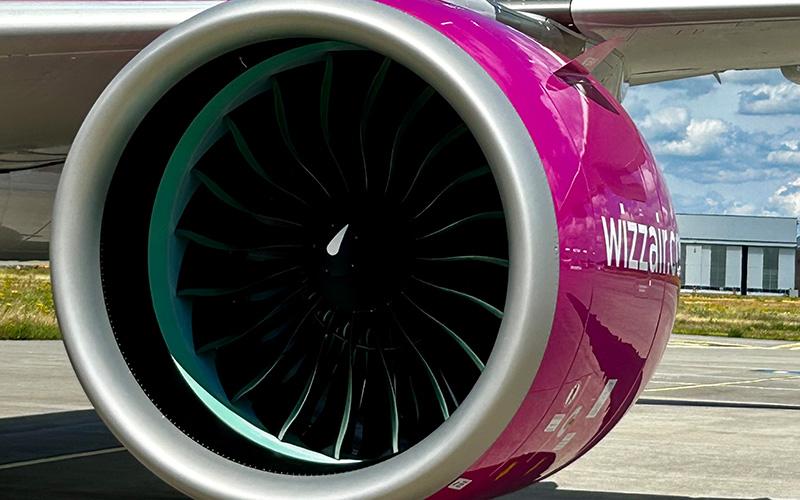This article is published in Aviation Week & Space Technology and is free to read until Jul 22, 2024. If you want to read more articles from this publication, please click the link to subscribe.

The GTF engine of Wizz Air's 132nd A321neo, which it took delivery of in July 2024.
HAMBURG—Wizz Air expects to have another 45 Airbus A320neo family aircraft grounded in 2025 due to inspections of their Pratt & Whitney geared turbofan (GTF) engines.
Wizz Air Group chief corporate officer Owain Jones said that in 2025, the ULCC will experience similar levels of disruption to 2024, with about 45 aircraft on the ground. The airline does not expect the situation to improve by 2026.
“For us, the key is predictability—to know how long the engine inspection will be taking [and when the engine will be] returning,” Jones told Aviation Week at Airbus’ Hamburg Finkenwerder facility as Wizz Air took delivery of its 132d A321neo and marked 20 years of Airbus operations.
When it comes to planning, Wizz Air expects each engine inspection to take 300 days.
Asked if Wizz Air is considering switching from Pratt & Whitney to CFM Leap engines, Jones said that would be an easy reaction. “Yes, at the moment it looks as though the Leap doesn’t have the same issues [as the GTF],” Jones said. Every new engine development goes through difficult phases, and for the Wizz Air fleet, it is the metal powder issue. “But that’s contained—it is being sorted,” Jones said.
“When we selected the Pratt & Whitney GTF, our view was that it had more potential for development in the future,” Jones added. “Ultimately, there is more scope for the aircraft when the engine is refined and delivers superior economics.”
Wizz Air operates 41 A320ceos, 41 A321ceos, six A320neos and 132 A321neos with an additional 320 Airbus aircraft scheduled for delivery, Jones said, noting that Wizz was one of the engine OEM’s biggest customers. Indeed, the carrier has the fourth-largest GTF backlog, the Aviation Week Network Fleet Discovery database shows, behind only Frontier Airlines, Delta Air Lines and United Airlines, making it Pratt’s largest customer for the powerplant outside the U.S.
And that backlog could rise. Fleet Discovery shows that Wizz Air has 176 A321neos on firm order from Airbus for which it has yet to order engines, and Pratt will hope to be selected.
Jones made clear that Wizz Air will continue to phase out its prior-generation A320s, as one of the airline’s key foundations is to have a young, reliable fleet that provides low unit costs. “For us, that drives the decision,” Jones said.
When the work with Pratt on the GTF powder metal issue is resolved, and accounting for ongoing aircraft deliveries, Jones expects Wizz Air to only be operating new aircraft, which offer 20% lower costs than the prior-generation A320.
Regarding financial compensation from Pratt, Jones said the cash from the engine-maker covers the costs for aircraft parking and maintenance.
“These costs are covered,” Jones said. “We knew what was coming with the grounded fleet [in 2024]. For us, fleet planning with the remaining aircraft was key to having a stable fleet plan.”
“On average, we keep our aircraft for 12 years,” Jones said. “That ties in any heavy maintenance cycle and engine shop visits. For us, [after] that is a good time to phase them out.” Wizz Air has extended the leases of around a dozen older A320s and said the ULCC’s leasing strategy aimed to be “very tactical.”
“We expect delivery of another 30 to 40 aircraft for 2025, including our first A321XLR,” Jones said, plus eight A321neo deliveries in 2024.
Wizz Air has operated an entirely Airbus fleet for 20 years. The airline placed its first Airbus order for 12 A320s in 2004.





